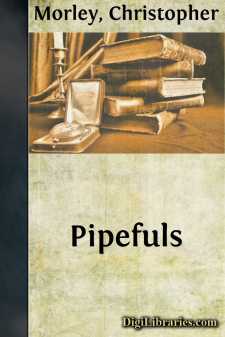Literary Collections
- American 84
- Ancient, Classical & Medieval 14
- Asian 1
- Australian & Oceanian 1
- Canadian 55
- Continental European 121
- English, Irish, Scottish, Welsh 179
- Essays
- General 24
- Letters 46
- Middle Eastern 1
Essays Books
Sort by:
In a little place called Le Monastier, in a pleasant highland valley fifteen miles from Le Puy, I spent about a month of fine days. Monastier is notable for the making of lace, for drunkenness, for freedom of language, and for unparalleled political dissension. There are adherents of each of the four French parties—Legitimists, Orleanists, Imperialists, and Republicans—in this little...
more...
by:
Anthony Trollope
THE MAN WHO HUNTS AND DOESN'T LIKE IT. It seems to be odd, at first sight, that there should be any such men as these; but their name and number is legion. If we were to deduct from the hunting-crowd farmers, and others who hunt because hunting is brought to their door, of the remainder we should find that the "men who don't like it" have the preponderance. It is pretty much the same,...
more...
by:
Max Beerbohm
Dandies and Dandies How very delightful Grego's drawings are! For all their mad perspective and crude colour, they have indeed the sentiment of style, and they reveal, with surer delicacy than does any other record, the spirit of Mr. Brummell's day. Grego guides me, as Virgil Dante, through all the mysteries of that other world. He shows me those stiff-necked, over-hatted, wasp-waisted...
more...
Considering that most friendships are made by mere hazard, how is it that men find themselves equipped and fortified with just the friends they need? We have heard of men who asserted that they would like to have more money, or more books, or more pairs of pyjamas; but we have never heard of a man saying that he did not have enough friends. For, while one can never have too many friends, yet those one...
more...
by:
James Payn
THE MIDWAY INN. 'The hidden but the common thought of all.' The thoughts I am about to set down are not my thoughts, for, as my friends say, I have given up the practice of thinking, or it may be, as my enemies say, I never had it. They are the thoughts of an acquaintance who thinks for me. I call him an acquaintance, though I pass as much of my time with him as with my nearest and...
more...
by:
Bernard Shaw
WHY NOT GIVE CHRISTIANITY A TRIAL? The question seems a hopeless one after 2000 years of resolute adherence to the old cry of "Not this man, but Barabbas." Yet it is beginning to look as if Barabbas was a failure, in spite of his strong right hand, his victories, his empires, his millions of money, and his moralities and churches and political constitutions. "This man" has not been a...
more...
by:
Frank Boreham
A SLICE OF INFINITY I Really, as I sit here in this quiet study, and glance round at the books upon the shelves, I can scarcely refrain from laughing at the fun we have had together. And to think of the way in which they came into my possession! It seems like a fairy story or a chapter from romance. If a man wants to spend an hour or so as delightfully as it is possible to spend it, let him invite to...
more...
by:
Jane Austen
LETTER the FIRST From ISABEL to LAURA How often, in answer to my repeated intreaties that you would give my Daughter a regular detail of the Misfortunes and Adventures of your Life, have you said "No, my freind never will I comply with your request till I may be no longer in Danger of again experiencing such dreadful ones." Surely that time is now at hand. You are this day 55. If a woman may...
more...
by:
Charles Cotton
Well, but some one will say to me, this design of making a man's self the subject of his writing, were indeed excusable in rare and famous men, who by their reputation had given others a curiosity to be fully informed of them. It is most true, I confess and know very well, that a mechanic will scarce lift his eyes from his work to look at an ordinary man, whereas a man will forsake his business...
more...
by:
John Galsworthy
THE ROAD The road stretched in a pale, straight streak, narrowing to a mere thread at the limit of vision—the only living thing in the wild darkness. All was very still. It had been raining; the wet heather and the pines gave forth scent, and little gusty shivers shook the dripping birch trees. In the pools of sky, between broken clouds, a few stars shone, and half of a thin moon was seen from time...
more...









![Love and Freindship [sic]](https://digilibraries-com.s3.eu-central-1.amazonaws.com/covers/81ed8b2a-f211-438d-aa33-5cd3b89d7a26.jpg)

